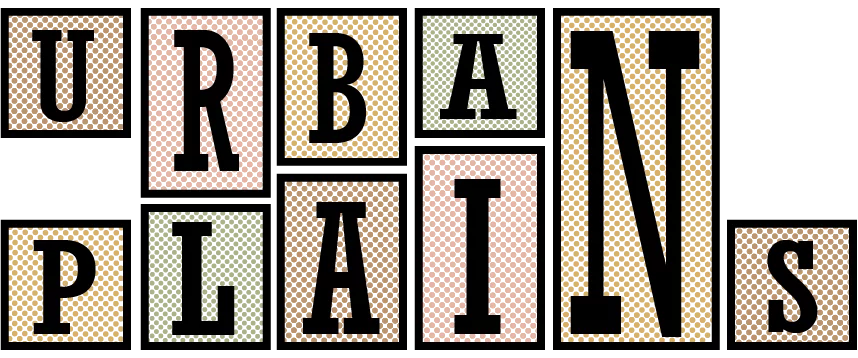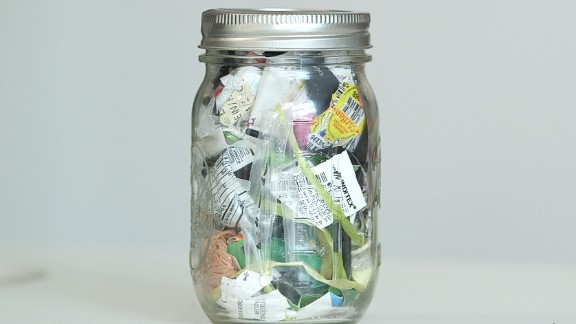
I try to live with the mindset “out of sight, out of mind.” I use it to help control my anxiety and worries about things that I cannot control. However, I’ve always had a hard time using that mindset when it comes to waste and recycle because I don’t want to contribute to the Great Pacific Garbage Patch. We’ve all seen the pictures of the turtles caught in plastic bags or the garbage washed to shore. According to Global Citizens, the world produces 2.3 billion tons of waste per year, which is enough to fill 822,000 Olympic-sized swimming pools. The average American produces 1,704 pounds of garbage each year.
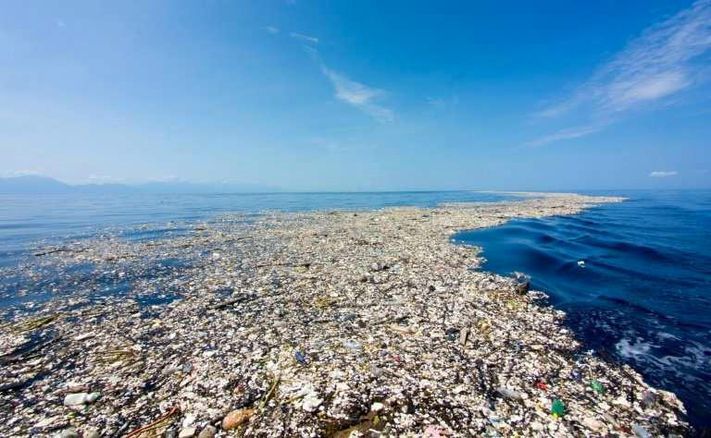
Zero waste is “the conservation of all resources by means of responsible production, consumption, reuse, and recovery of products, packaging, and materials without burning and with no discharges to land, water, or air that threaten the environment or human health.” Since we are still in the COVID-19 pandemic, I realized that going zero waste by definition is nearly impossible for me so I decided to go “minimal waste.” I use that term because I will recycle what I can, compost as much as possible, and understand the value and impact of what I throw away. It should be noted that I already use reusable water bottles; I don’t drink out of single-use plastic bottles.
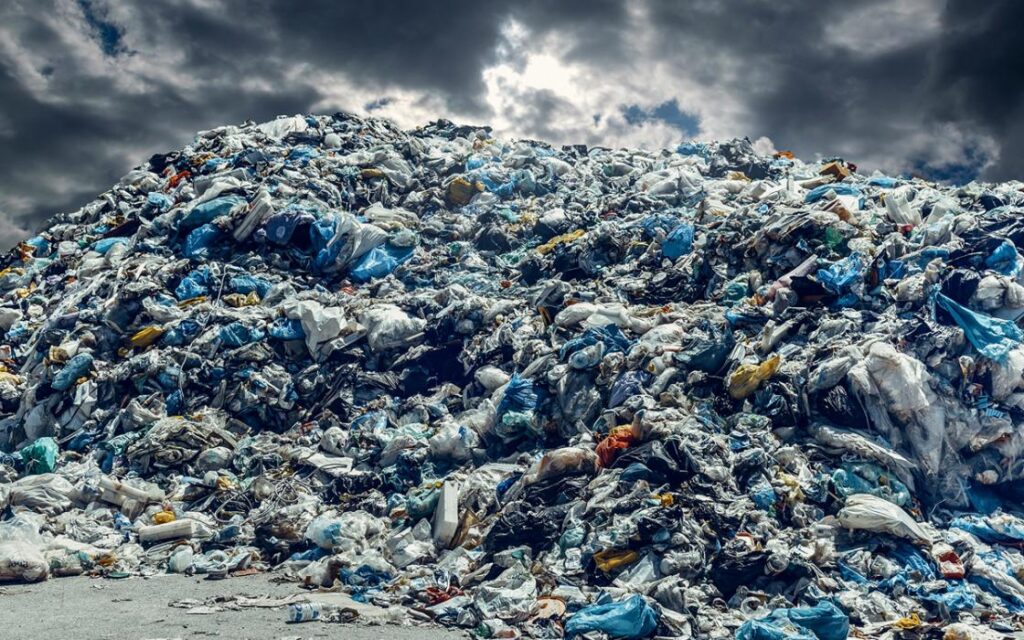
In 2012, I went on a bike trip around Lake Michigan. The beauty and nature that surrounded me were inspirational. The trip leader had one rule that stood out to me: no styrofoam. He told our group that styrofoam takes 500 years to decompose. That was when I decided to change my lifestyle. I quickly realized that I don’t want to leave that kind of footprint on the planet and whatever footprint I do leave, I don’t want it to last forever. Since 2012, I have not used styrofoam or single-use water bottles. However, as I’ve taken more environmental science classes, I have become more aware of what I waste. I don’t want to thoughtlessly throw garbage away; I want to understand and acknowledge my contribution to landfills. This made me decide to challenge myself; I went zero waste for two weeks.
“We don’t inherit the earth from our ancestors; we borrow it from our children.” -Native American proverb
Preparation Items
To prepare for this experience, I bought reusable vegetable bags for the grocery store. I already had reusable grocery bags so I didn’t have to worry about that. Like lots of college students, I live in an apartment complex and don’t have access to standard yard compost. Because of this, I needed to find places in Des Moines that accept food compost. I made roughly eight phone calls to various small farms within the greater Des Moines area and left them all voice messages. I eventually heard back from Sweet Tooth Farms and the Iowa Food Co-op, both of which accept food waste compost.
These are the items I used the most during my minimal waste weeks:
Method:
First, I went to get groceries. I decided to go to Whole Foods because, although much more expensive, I wanted to be as healthy and environmentally friendly as possible, and felt that Whole Foods represented those values. I brought my four reusable grocery bags, a bunch of vegetable bags, and my grocery list. Once my shopping was complete, I headed home to start meal prep and cooking.
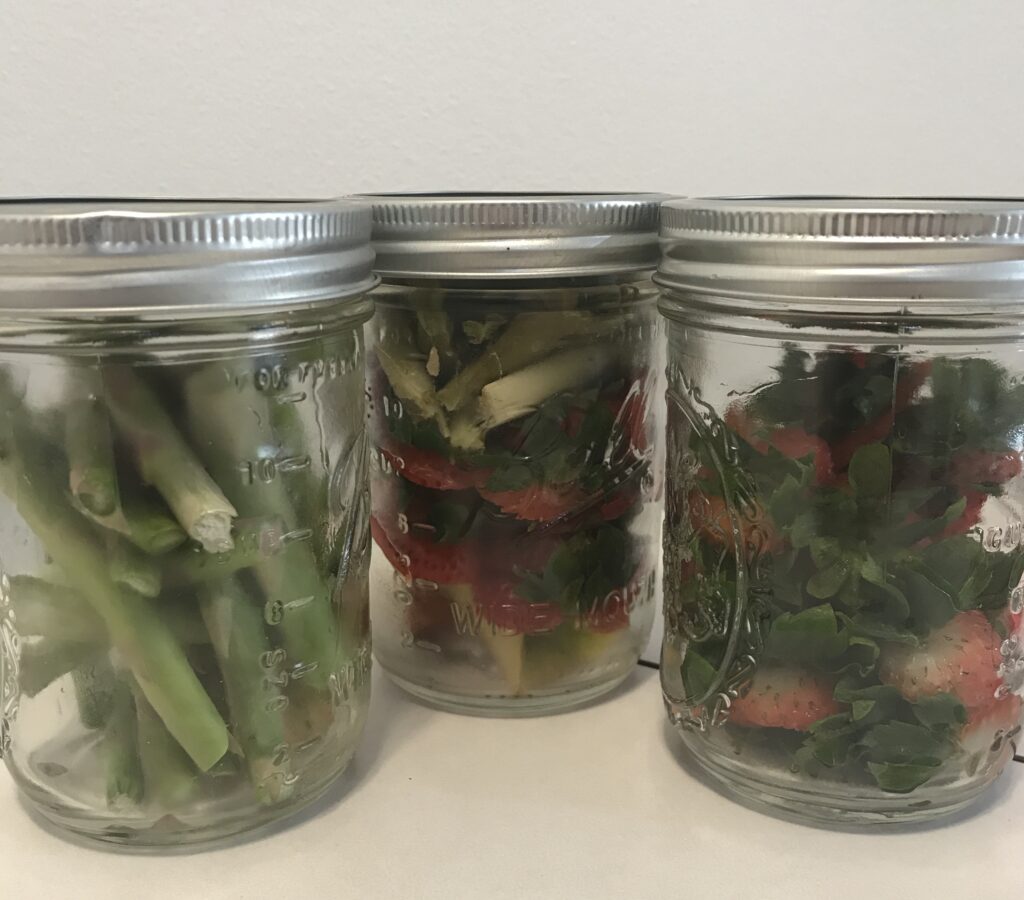
Every time I worked in the kitchen, I kept my compost in a Mason jar next to me so that I didn’t have to go out of my way to compost. When I wasn’t actively using the Mason jars, they were sealed and stored in my refrigerator. I noticed that as much as I was composting—and it was a good amount—I was also producing a lot of waste. I try to mix up my proteins so I go to the fish counter and get a salmon filet about once or twice a week. It usually makes me pretty happy to go to the counter because I feel that I won’t waste anything because the fish is wrapped in paper. However, when I prepare the salmon, the paper ends up being wasted. Can I compost the paper? I really don’t know. I assumed no because if a pizza container has more than 5% contaminants, it is not recyclable. In this case, the paper had touched the fish so I deemed it not recyclable and I threw the paper away. If you go to Whole Foods, you know that the salmon filets come with the skin and scales still on. The salmon skin, and any other meat products, is not readily compostable because of the odor it emits and the rodents it attracts, so I also threw the skin away. This didn’t bother me though; I know it decomposes rather easily so I don’t consider that waste.
As I was preparing meals, I began to realize how hard it is to actually create minimal waste, let alone zero waste. I knew this experiment would be difficult because it’s hard to change habits that have become second nature. However, I wanted to challenge myself and figure out how to live a more environmentally conscious lifestyle.
Results:
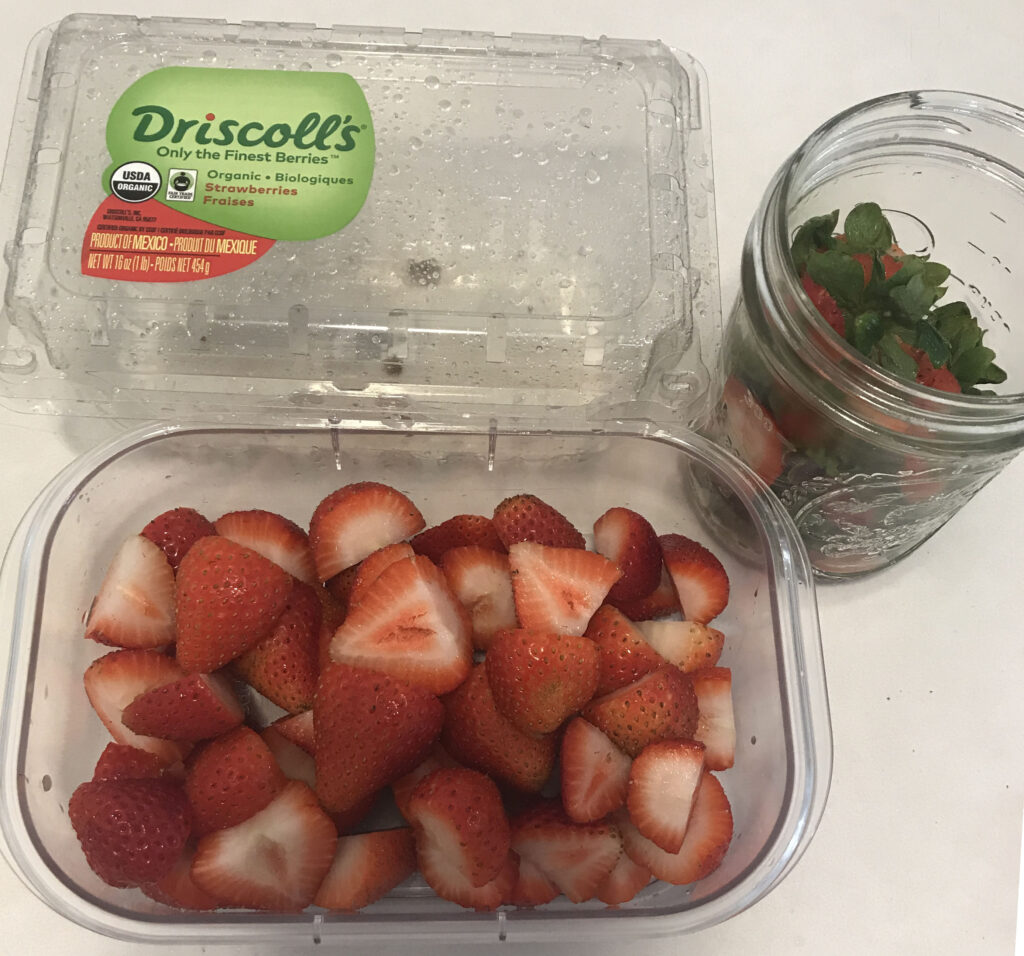
This was harder than I thought it would be, yet pretty simple. The easiest part was composting; I kept my compost jar next to me as I prepared and made dinner. The hardest part was feeling that I needed to live my life around zero waste. I didn’t realize how much waste groceries generally produce: the plastic container berries come in, the rubber bands around asparagus, the containers for chicken or fish. All that waste adds up quickly and can make any environmentalist uncomfortable.
“You cannot get through a single day without having an impact on the world around you. What you do makes a difference and you have to decide what kind of difference you want to make.” – Jane Goodall, Scientist & Activist
What I Learned:
This was eye-opening. Even when I tried not to create any waste, there were factors I couldn’t control: how food is packaged, what it’s packaged in, and if the packaging is recyclable. I can control the water I waste, the compost I produce, and what I recycle (if I can recycle). As a college student living in an apartment complex, it’s hard to go zero waste. I’ve learned producing the minimum amount of waste might require more money than a college student has.
Other ways of going green:
If you want to lessen your environmental footprint, there are easier ways to do it besides being zero waste. I’ve compiled a list of recommendations that anybody can implement in their lifestyle.
- Use a reusable water bottle. I recommend HydroFlask or Nalgene. HydroFlask keeps your drink hot or cold for a while and Nalgenes are famously durable. I’ve dropped my Nalgene off a two-story building by accident and it didn’t break. Both can have incredibly long lifespans. I’ve used my Nalgene for probably 15 years and my HydroFlask since 2012. Make sure you clean them on a regular basis.
- Don’t waste water. As much as we take clean water for granted, many parts of the world don’t have access to safe drinking water. When you’re at a restaurant, you don’t always need your glass of water refilled if you won’t finish it. Don’t dump out water from your water bottle. Take quicker showers. A five-minute shower uses more water than a person in a developing country uses in a day. Turning off the faucet when you are doing dishes or brushing your teeth can really help. Personally, I turn off the shower when I’m not rinsing.
- Turn your lights off and unplug your electronics. There is no reason to keep lights on when you aren’t using them. Not only will it save you money, but it also saves energy in the long run. Surprisingly, all electronics use energy when they’re plugged in, even if they are powered off. This “vampire energy” costs $19 billion per year in the United States alone.
- Be careful where you shop and who you support. Farmers markets promote sustainability. They help reduce the amount of waste and pollution created. Most of the produce sold is sustainably grown which means that the soil and water are free from the pollution of pesticides. You will also be supporting local farmers which helps stimulate local economies, supports healthy communities, and promotes sustainability. According to the Farmers Market Coalition, three out of four farmers selling at farmers markets use sustainable, organic practices
- Always keep reusable bags in your car. I was surprised how many times I ran to the grocery store to get some vegetables for dinner and forgot my reusable bags at home. I decided to keep some of my bags in my car just in case I needed that random grocery store run. It was extremely handy when I ran out of paper towels and laundry detergent, then had to run to the store.
“When G-d had finished showing human beings the earth, he said to them, ‘See how beautiful my world is. I created it for your sake. Take care of my world and do not destroy it, for if you do, there will be no one else to repair it.’” – Jewish Midrash
